<> Junonia lemonias (Linnaeus,1758) <>
the Lemon Pansy ผีเสื้อแพนซีสีตาล
Click on any photo to see all photos full size in Lightbox
Additions and corrections to the information provided on this page is always welcome. Please use the Contact form.
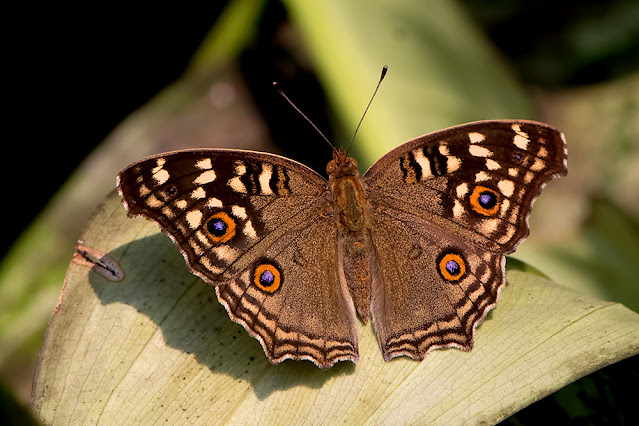
Photo taken at Lamnamkok National Park, Chiang Rai, Thailand. 450m a.s.l.

Junonia lemonias is a common species across most of the SE Asia region with the exception of the most southerly parts. There is no dimorphism and the sexes look the same. There is a difference between the wet season form (wsf) and the dry season form (dsf), both in markings and wing shape. In the dry season form the markings become paler and there are changes to the shape of the wings. The changes are most noticeable on the underside of the wings where the markings almost completely disappear and at the apex of the forewing where the shape becomes more falcate (hooked). It is a very active butterfly and a strong flier although most of the time it stays close to the ground. When it basks in the sun it does so on low vegetation with its wings wide open. When feeding on nectar or puddling it does so with its wings closed or partially open.
This species is multivoltine and there are a number of generations each year. The adult female lays her eggs singly on the upperside or underside of a leaf on the host plant and sometimes on the ground close by. She can lay up to 10 eggs at a time but each one on different leaves. On hatching the larva eats the eggshell as its first meal. The larvae then feed mainly on the younger leaves and stays on the underside of the leaf where, if disturbed, it will instantly fall to the ground where it stays well hidden in the leaf litter until the danger has gone.
Synonyms and previously used names: Papilio lemonias, Papilio aonis, Precis lemonias, Junonia nirei
Taxonomy: Animalia - Arthropoda - Insecta - Lepidoptera - Nymphalidae - Nymphalinae - Junonia - lemonias
Regional subspecies: Junonia lemonias aenaria (Taiwan), Junonia lemonias lemonias (India, Bangladesh, Myanmar, Thailand, Laos, Cambodia, Vietnam, China, W.Malaysia, Philippines)
Regional Distribution: India, Nepal, Bhutan, Bangladesh, Myanmar, Thailand, Laos, Cambodia, Vietnam, China, Taiwan, Malaysia, Philippines
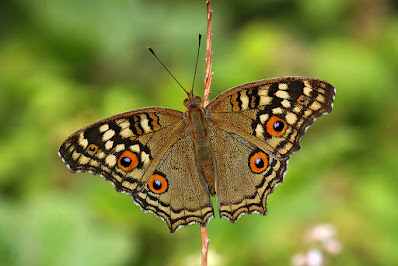 |
| Prasat Preah Khan, Siem Reap, Cambodia c.100m a.s.l. |
Habitat: Junonia lemonias is found in a wide variety of habitats including secondary and montane forest, grassland, scrubland, and urban parks and gardens. It is often seen in the vicinity of rivers and streams, usually at low to moderate elevations but has been recorded up to 2000m a.s.l.
Flight time: all year, depending on location Wingspan: 45-60mm
Life History: egg 3 days instar 1 2-3 days instar 2 2-4 days instar 3 2-3 days instar 4 2-4 days instar 5 3-5 days pupa 6-15 days Total egg to adult 20-35 days
All times are approximate and can vary depending on the season and on the host used.
Larval Hosts: Asystasia gangetica, Barleria buxifolia, Barleria cristata, Barleria lupulina, Barleria prionitis, Eranthemum pulchellum, Hygrophila auriculata, Hygrophila erecta, Hygrophila ringens, Justicia micrantha, Justicia neesiana, Lepidagathis cuspidata, Lepidagathis formosensis, Lepidagathis incurva, Lepidagathis keralensis, Lepidagathis prostrata, Nelsonia canescens, Rostellularia procumbens, Ruellia blechum, Ruellia prostrata, Ruellia simplex, Ruellia tuberosa, Rungia repens, Strobilanthes formosana, Strobilanthes hirta, Strobilanthes schomburgkii (Acanthaceae), Lindernia rotundifolia (Linderniaceae), Cannabis sativa (Cannabaceae), Alternanthera philoxeroides, Alternanthera sessilis (Amaranthaceae), Ophiorrhiza japonica (Rubiaceae), Phyla nodiflora (Verbenaceae), Corchorus capsularis, Sida cordifolia, Sida rhombifolia (Malvaceae), Ipomoea batatas (Convolvulaceae), Misopates orontium (Plantaginaceae).
Actual host plant used depends upon location and availabilty of plant species.
Adult Food Sources: Nectar - Cytisus scoparius, Tephrosia purpurea (Fabaceae), Acmella paniculata, Ageratina adenophora, Bidens pilosa, Chromolaena odorata, Cosmos sulphureus, Crassocephalum cerpidioides, Gynura nitida, Parthenium hysterophorus, Sphagneticola calendulacea, Taraxacum javanicum, Tithonia diversifolia, Tridax procumbens, Xerochrysum bracteatum, Youngia japonica, Zinnia elegans (Asteraceae), Celosia argentea, Gomphrena globosa (Amaranthaceae), Asclepias curassavica (Apocynaceae), Coleus barbatus, Leucas lamiifolia, Platostoma axillaris, Premna serratifolia, Rotheca serrata, Tectona grandis, Vitex negundo (Lamiaceae), Duranta erecta, Lantana camara, Stachytarpheta jamaicensis, Verbena rigida (Verbenaceae), Cestrum aurantiacum, Solanum mauritianum (Solanaceae), Hypericum japonicum, Hypericum mysurense (Hypericaceae), Pseuderanthemum reticulatum, Rostellularia procumbens (Acanthaceae), Sida acuta, Sida cordifolia (Malvaceae), Oplismenus undulatifolius (Poaceae), Oxalis latifolia (Oxalidaceae), Verbascum thapsus (Scrophulariaceae), Heynea trijuga (Meliaceae), Mappia nimmoniana (Icacinaceae), Rhodomyrtus tomentosa (Myrtaceae), Oenothera rosea (Onagraceae), Prinsepia utilis, Rubus ellipticus (Rosaceae), Rhamnus wightii, Ziziphus oenoplia (Rhamnaceae), Euphorbia milii, Euphorbia rothiana (Euphorbiaceae), Anacardium occidentale (Anacardiaceae), Antigonon leptopus (Polygonaceae), Santalum album (Santalaceae), Spermacoce hispida (Rubiaceae), Terminalia arjuna (Combretaceae), Melastoma malabathricum (Melastomataceae), Terminalia pallida (Combretaceae), Lagerstroemia indica (Lythraceae). Other - mud puddling, over-ripe fruit
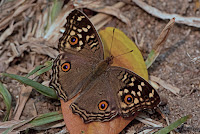 |
| Lamnamkok National Park, Chiang Rai, Thailand |
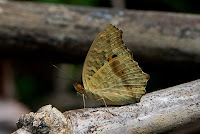 |
| Doi Suthep-Pui National Park, Chiang Mai, Thailand |
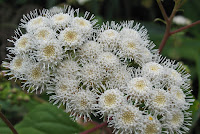 |
| Ageratina adenophora, a nectar source |
 |
| Duranta erecta, another nectar source |
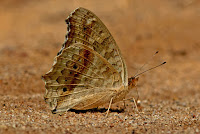 |
| Doi Suthep-Pui National Park, Chiang Mai, Thailand |
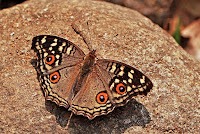 |
| Lamnamkok National Park, Chiang Rai, Thailand |
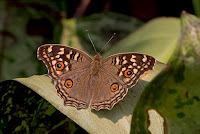 |
| Lamnamkok National Park, Chiang Rai, Thailand |
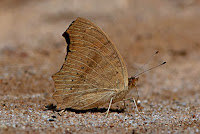 |
| Doi Suthep-Pui National Park, Chiang Mai, Thailand (dsf) |
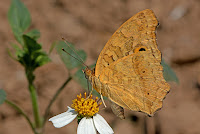 |
| Tat Sae Waterfall area, Luang Prabang, Laos |
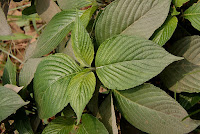 |
| Eranthemum pulchellum, a larval host |
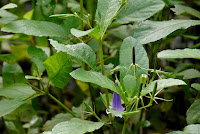 |
| Ruellia tuberosa, another larval host |
Links to other pages in this series for species in the same subfamily
Junonia lemonias
Symbrenthia hypatia
Vanessa indica
